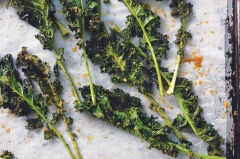If you are human, then you search for meaning. That’s the noble view of how we operate. But perhaps we could replace the word “meaning” with “understanding”, because the real human quest is to understand what is happening around us so that we can make the best decisions. It is a survival tactic, and it involves understanding not only the world around us, but also the world within us. Part of the search for understanding will involve you in seeking narratives that weave your past, present and future together. That is why anything that claims to reveal your personality feels so good. Nothing quite tickles your pleasure gland like being told you are “practical and grounded”, “spontaneous and playful”, “dramatic and free-spirited”, or “dedicated and passionate”. Even a negative personality appraisal can spill warm-fuzziness into your bloodstream. For very good reasons, you love to gain insight to your own psyche, but could your food choices provide a window to your soul?
It’s in your blood
Using your food choices to understand your personality might sound a little bit like using a screwdriver to explain dark matter, but there actually is a little science to support the food-persona theorem.
In 2022, the journal Current Research in Food Science published a paper by experimental psychologist Charles Spence from the University of Oxford. The paper was titled “What is the link between personality and food behaviour?”. In that paper, Spence pointed out some of the physiological basis for expecting a connection between the food that you choose and your personality.
For a start, there is research telling us that high levels of the hormone noradrenaline in your central nervous system have been suggested to link to both shyness and sensitivity of smell. Since taste is multisensorial, resulting from combined input from all your senses, anything that influences personality and your olfactory sensitivity suggests a food-personality link. Spence also reports that sex hormones have been linked to both personality attributes and food preferences.
In 2015, the European Journal of Pharmacology published a study showing that there are receptors for stress hormones (notably glucocorticoids) located within the taste buds that detect both sweetness and umami. This suggests that at a biological level, there is some sort of coupling between your disposition to stress and how you taste foods.
Spence concludes his paper by saying that there is a bidirectional link between taste and mood, and that differences in food behaviour “have been linked to differences in circulating levels of neurotransmitters and hormones in both normal and clinical populations.”
Given that there does seem to be a biological basis for the food choice/personality link, let’s see how that plays out.
Some bitter-sweet truths
If you like your foods bitter, then buckle up because the news is not good. The results of two studies led
by Christina Sagioglou, Assistant Professor for Social Psychology at the University of Innsbruck, Austria, showed that people with a preference for bitter tastes were more likely to show malevolent personality traits, specifically “everyday sadism and psychopathy”. Exactly what “everyday sadism” looks like is best left to the imagination, but it can’t be good.
By contrast, people who don’t like bitter foods can be more jumpy than other people. We know that about 30 per cent of people can detect the bitter substance 6-n-propylthiouracil even when it is in very low concentrations. This is genetically based and arises from how many fungiform papillae you have on your tongue. The more fungiform papillae, the less you like bitter tastes, and the more likely you are to be sensitive and easily startled.
In the Spence paper mentioned above, he reported that people who like spicy foods tend to be sensation seeking and have an openness to novel experiences. People who like salty foods also tend to like unusual experiences, while anxious people tend to prefer a narrower range of foods.
As we have said, the relat





